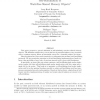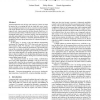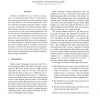174 search results - page 10 / 35 » Exceptionally Safe Futures |
WDAG
1995
Springer
13 years 11 months ago
1995
Springer
This paper proposes a general definition of self-stabilizing wait-free shared memory objects. The definition ensures that, even in the face of processor failures, every executio...
ENTCS
2007
13 years 7 months ago
2007
Transient faults that arise in large-scale software systems can often be repaired by re-executing the code in which they occur. Ascribing a meaningful semantics for safe re-execut...
FSR
2007
Springer
14 years 1 months ago
2007
Springer
Current Mars rovers travel a few kilometers per year. Future rovers will need to travel a couple orders of magnitude faster than that in order to move from safe landing zones to a...
SEFM
2008
IEEE
14 years 2 months ago
2008
IEEE
Attempts to dereference null result in an exception or a segmentation fault. Hence it is important to know those program points where this might occur and prove the others (or the...
TPHOL
2009
IEEE
14 years 2 months ago
2009
IEEE
Abstract. FinFuns are total functions that are constant except for a finite set of points, i.e. a generalisation of finite maps. We formalise them in Isabelle/HOL and present how...



